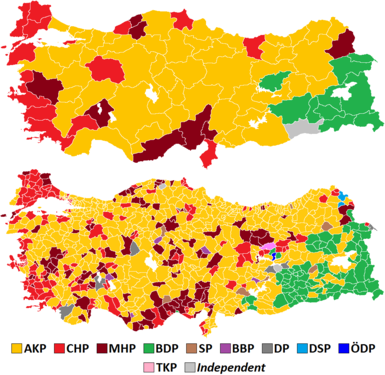Turkish local elections, 2014
|
|
|||||||||||||||||||||||||||||||||||||||||||||||||||||||||||||||||||||||
|---|---|---|---|---|---|---|---|---|---|---|---|---|---|---|---|---|---|---|---|---|---|---|---|---|---|---|---|---|---|---|---|---|---|---|---|---|---|---|---|---|---|---|---|---|---|---|---|---|---|---|---|---|---|---|---|---|---|---|---|---|---|---|---|---|---|---|---|---|---|---|---|
|
|||||||||||||||||||||||||||||||||||||||||||||||||||||||||||||||||||||||
|
All 30 metropolitan and 1,351 district municipal mayors of Turkey All 1,251 provincial and 20,500 municipal councillors of Turkey |
|||||||||||||||||||||||||||||||||||||||||||||||||||||||||||||||||||||||
|
|||||||||||||||||||||||||||||||||||||||||||||||||||||||||||||||||||||||

Results map showing the winning party by provincial capitals (top) and by the districts of Turkey (bottom)
^ Four different elections in order to elect both types of councillor and mayor were held on the same day. The results shown here are the municipal councillor election results, which best reflect the overall voting intentions of the electorate. See the results section for the full results. * The Peace and Democracy Party (BDP) ran alongside the Peoples' Democratic Party (HDP). The combined results of both are shown. |
|||||||||||||||||||||||||||||||||||||||||||||||||||||||||||||||||||||||
Local elections (formal: Local authority general elections, Turkish: Mahalli İdareler Genel Seçimi or simply Yerel Seçimleri) were held in Turkey on 30 March 2014, with some repeated on 1 June 2014. Metropolitan and district mayors as well as their municipal council members in cities, and muhtars and "elderly councils" in rural areas (and also in mahalles within urban areas) were elected. In light of the controversy around the elections, it was viewed as a referendum on the government of Prime Minister Recep Tayyip Erdoğan. About 50 million people were eligible to vote.
A local government re-organisation took place before the election, lowering the total number of elected officials from 38,592 to 23,132. Almost 1,500 beldes (small municipal towns) had their municipalities abolished, meaning that a significantly fewer number of mayors were elected compared to the 2009 local elections. Most provinces no longer elect any provincial councillors. The number of metropolitan municipalities, however, rose from 16 to 30.
The elections were marred by allegations of electoral fraud and violence, with both opposition and ruling party candidates alike refusing to recognise a wide variety of results. Significant cases of fraud in Ankara and Yalova were referred to the Supreme Electoral Council of Turkey for reviewal. Allegations of misconduct included the untimely power cuts in several areas while the votes were being counted (claimed to be caused by cats entering transformers), intimidation by government forces such as the European Union Minister Mevlüt Çavuşoğlu and the Anatolian Agency in electorally strategic districts, the theft and burning of votes cast for opposition candidates and the recording of opposition votes as invalid or blank. The elections had been controversial due to allegations of government corruption, voter bribery and the lack of up-to-date voter records beforehand.
...
Wikipedia




